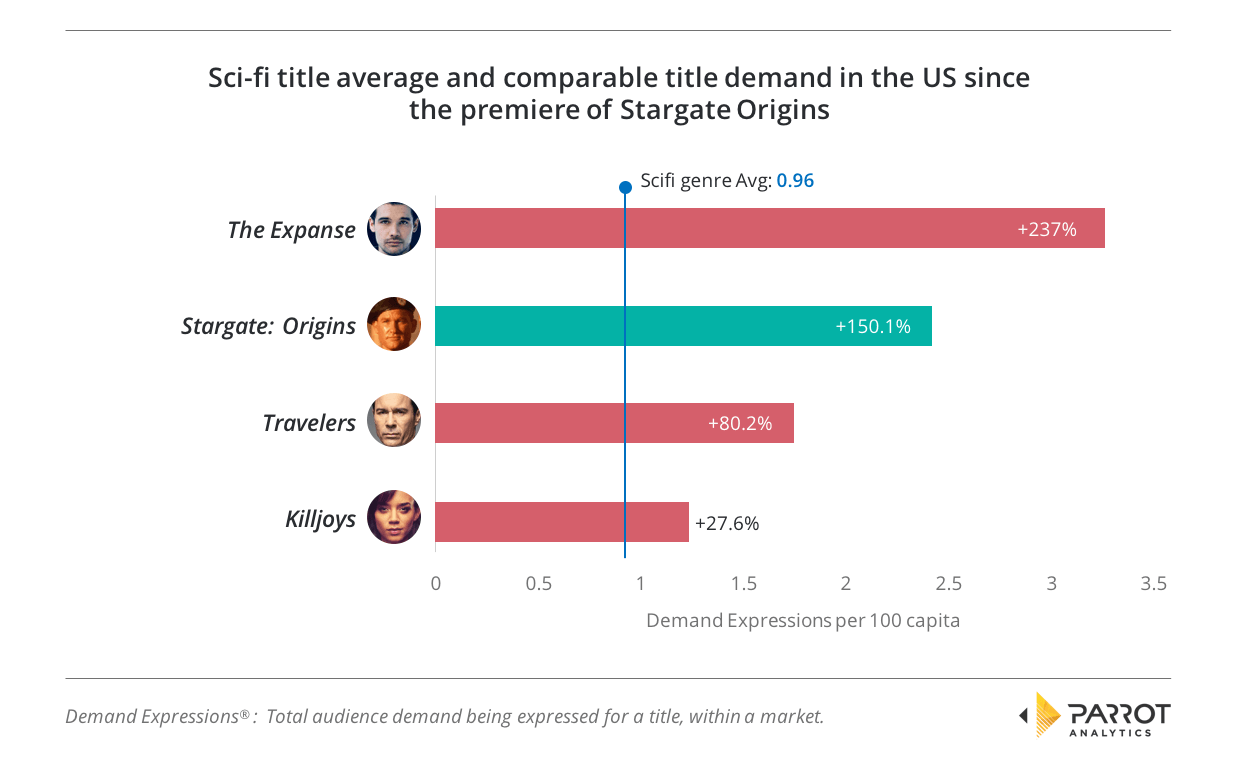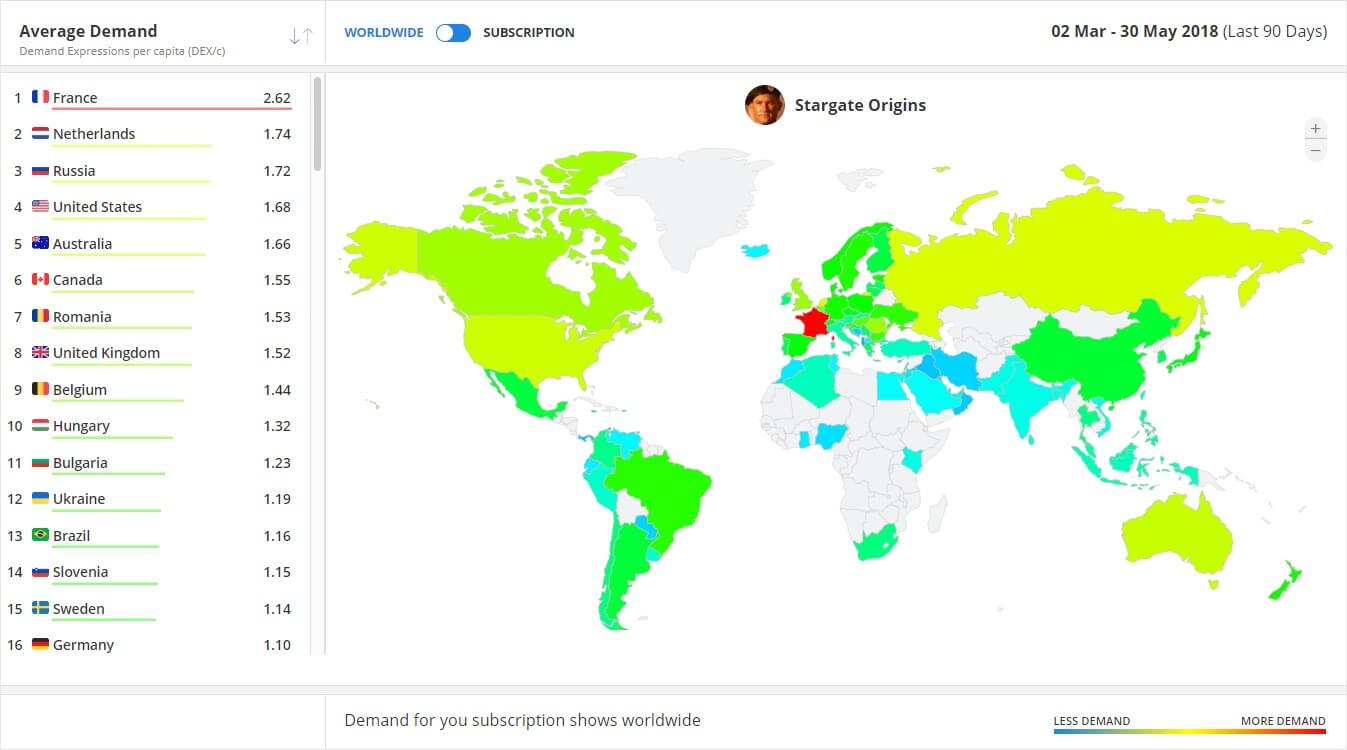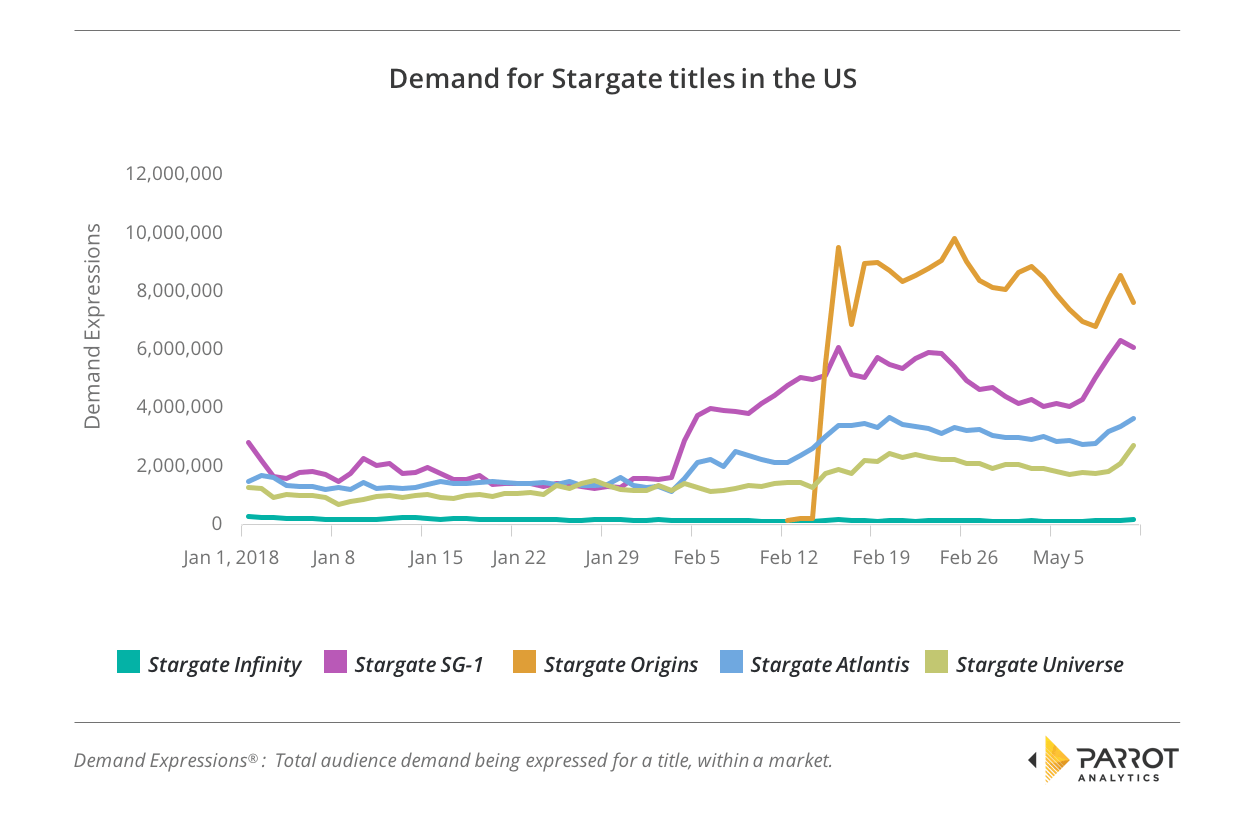Image: Stargate: Origins, Stargate Command
On 14th February 2018, the latest installment of the long-running Stargate sci-fi franchise was released. What makes this series particularly interesting is the distribution method employed by MGM: Instead of licensing the show to a traditional broadcast or cable network or even established streaming platforms, MGM opted to set up a franchise-specific platform called Stargate Command.
The business case behind the Stargate Command platform
As the number of streaming services grows seemingly by the day, what made MGM think that they could stand out from the crowd of specialist services and attract a viable audience?
The answer lies in the unusual set-up for subscribing to the platform. Membership to Stargate Command grants access to streaming for Origins, as well as all the previous series and films that make up the Stargate franchise catalog. Unlike the established streaming business models, membership of the site is not a monthly fee. Rather, Stargate Command membership is a one-time US$20 charge. Note: The one-time fee “All-Access Pass” will be available until September 2018.
This approach offers a clear advantage to a highly-focused, low-volume platform compared to a monthly fee structure. For a start, with no pressure to reduce monthly churn, MGM can concentrate on a small number of high quality releases rather than risk angering subscribers by overly stretching out release windows, or lowering the quality on their offerings.
Another factor that would have affected MGM’s decision-making is the strength of the Stargate franchise. Since the release of the first film in 1994, there has been a passionate base of fans that is very dedicated to the franchise.
Further, the franchise has one of the largest fan wikia sites, ahead of many other sci-fi and fantasy franchises. Additionally, actors from the various Stargate shows are a consistent draw at fan conventions worldwide. With a healthy franchise fanbase like this, there would be a significant proportion of hardcore fans that would regard US$20 as a small price to pay for new, official Stargate content.
However, as Star Trek: Discovery showed for CBS All Access, the success of a new platform is heavily dependent on the launch of its first major title.
How was the release of Stargate: Origins received?
Luckily for MGM, Stargate: Origins has performed well in the USA. With around 2.5 times the average demand of a sci-fi title, Origins is a solid performer in the genre, placing it around the performance of titles like The Expanse (now moving to Amazon Video), Travelers and Killjoys.
We should point out that this is nowhere close to the demand of genre megahits like Stranger Things or Star Trek: Discovery, however, it would be a surprise if Origins becoming a blockbuster was an expected outcome for MGM.
The ranking of Stargate: Origins in the US market since release continues this trend; in the first quarter, the title was the 12th most in-demand sci-fi title and the 238th most in-demand of all titles. Very few executives would be disappointed by these results for a cable sci-fi show, so considering the niche distribution method, these are excellent numbers.
As part of a global franchise, Stargate: Origins performs well worldwide
However, the US numbers do not tell the full story of Origin’s success. By looking at the Demand Expressions per capita metric for Stargate: Origins, as a percentage of the show’s demand in its home market of the US, we can see exactly how well the title has performed in international markets:
Overall, Stargate: Origins is a strong performer with a global travelability score of 40%. As a comparison, although Hulu’s drama The Handmaid’s Tale achieved great success domestically and generated a lot of critical and social media buzz, the show was not available internationally in many markets for some months after the American premiere.
Consequently, for the four months after The Handmaid’s Tale was released in the US it had a travelability of 26%*; Stargate: Origins travels around 1.5 times better. (Note: The Handmaid’s Tale’s travelability has improved since, as more markets get official access).
Regional highlights include North America, where Stargate: Origins has 89% travelability, followed by Oceania at 83% and Europe, which has 56% as much demand for the show as the US does.
Looking at individual markets over the last 90 days, Stargate: Origins is particularly popular in France (2.62 Demand Expressions per capita, DEX/c), Netherlands (1.74 DEX/c) and Russia (1.72 DEX/c). We note in particular that France actually has 55.9% more demand per capita than the U.S.
Our global demand data clearly shows that MGM has missed out on a direct-do-consumer distribution opportunity by restricting All-Access (and consequently Stargate: Origins) to only 6 markets – the United States, United Kingdom, Germany, Canada, Australia and New Zealand; particularly it means the company has not capitalized on the very strong demand in France.
Supporting this, our examination of the breakdown of French demand for the month after the release shows that a higher-than-usual amount of demand is due to downloads/streaming. This is not surprising as French Stargate fans are not able to watch it legally.
While a full international release has many challenges, content availability positively impacts piracy and, perhaps more importantly for a franchise where the fanbase is so important, avoids annoying fans who live in the “wrong” market.
Interest in Stargate: Origins is lifting demand for the rest of the franchise
As the Stargate Command platform also offers streaming of the older titles in the Stargate franchise, it is unsurprising that the interest in Stargate: Origins is also boosting the demand for these other titles. This graph shows daily demand in the US for the individual Stargate titles:
Stargate: SG-1 and Stargate: Atlantis have noticeable increases in the weeks prior the premiere of Origins, likely due to franchise fans re-watching these older series to prepare for the new content. Between the 4th and the 14th of February, the average demand for SG-1 jumps by 160% compared to the baseline demand beforehand. After the premiere of Origins on the 14th the average increases again from this, rising another 20%. For Atlantis the increases are 68% then 41%.
While Stargate: Universe doesn’t gain much demand before Origins premieres it does gains an increase after that event, with average demand almost doubling compared to before the premiere.
The animated series Stargate: Infinity was considerably less popular than the other series before the release of Origins. Infinity also experienced a lift in demand after the premiere of Origins, but as Infinity is not one of the shows available for streaming on the Stargate Command platform- making it comparatively much harder to view – this lift was minor and not sustained.
The example of the Stargate Command platform and the launch of Stargate: Origins demonstrates that in the era of “Peak TV”, bold and unorthodox distribution approaches that leverage the strengths of their titles can thrive.
Please note: An earlier version of this article incorrectly stated that Stargate Command All-Access was available worldwide. In fact, while the free portions of the Stargate Command site are available globally; All-Access is only available in six markets. The analysis has been updated to reflect this.





